|
|
|
Sort Order |
|
|
|
Items / Page
|
|
|
|
|
|
|
| Srl | Item |
| 1 |
ID:
050789
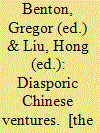

|
|
|
|
|
| Publication |
London, routledgeCurzon, 2004.
|
| Description |
ix, 246p.hbk
|
| Standard Number |
0415331420
|
|
|
|
|
|
|
|
|
|
|
|
Copies: C:1/I:0,R:0,Q:0
Circulation
| Accession# | Call# | Current Location | Status | Policy | Location |
| 047862 | 950.049510092/BEN 047862 | Main | On Shelf | General | |
|
|
|
|
| 2 |
ID:
152487
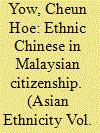

|
|
|
|
|
| Summary/Abstract |
The ethnic Chinese in Malaysia are a significant minority who call for a critical assessment as far as their cultural identity and political positioning are concerned. Appropriating the concept of ‘multicultural citizenship’, this article attempts to dissect various demands and aspirations of the ethnic Chinese in Malaysia’s multiracial hierarchy. It suggests that using the lens of multicultural citizenship can help shed light on Malaysian Chinese as well as the entire nation, where ethnicity and citizenship are gridlocked in historical formation and political hierarchy. In recent times, Malaysian Chinese have articulated their political desires and demands in order to get rid of the disgrace of racial constraints, and also to envisage a more inclusive multicultural citizenship for Malaysia as a nation-state. This article also compares and contrasts three Chinese public figures who have taken disparate stands and approaches with regard to language, culture, race, nation, and party politics.
|
|
|
|
|
|
|
|
|
|
|
|
|
|
|
|
| 3 |
ID:
091095
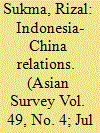

|
|
|
|
|
| Publication |
2009.
|
| Summary/Abstract |
Indonesia's relations with China began to improve in 1998. This paper argues that recent improvements in bilateral relations have been primarily the function of changes in Indonesia's domestic politics and China's policy toward Southeast Asia, which contributed to the creation of an atmosphere of trust and comfort in Jakarta's re-engagement with China.
|
|
|
|
|
|
|
|
|
|
|
|
|
|
|
|
| 4 |
ID:
114683
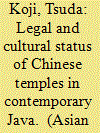

|
|
|
|
|
| Publication |
2012.
|
| Summary/Abstract |
Since the collapse of Soeharto's New Order in 1998, Indonesia has been experiencing broad political and social changes. While the Soeharto regime was generally cautionary and oppressive toward anything related to China or the ethnic Chinese, the subsequent administrations faced the pressure to make sweeping changes to existing discriminatory policies and laws, and have put these changes into action, though gradually. With this major change in the social environment, an atmosphere is being engendered across the nation, producing a feeling that anyone is free to enjoy 'Chinese culture' which for a long time was banned from being expressed in public. This spirit is palpable for example during Chinese New Year, when red lanterns and other ornate decorations, and characters such as Gong Xi Fa Cai () are seen dancing about everywhere. Along with upscale malls and hotels, it is Chinese temples (klenteng) that have become the centers of these festivities. Having been the anchorage of traditional worship for the ethnic Chinese, during the Soeharto era these facilities were the target of unfavorable treatment. In the last few years, their activities have gradually been revitalized. This article scrutinizes the changed legal and cultural status of the Chinese temples engendering changes within the Chinese community at large, by focusing on developments in post-'New Order' Java.
|
|
|
|
|
|
|
|
|
|
|
|
|
|
|
|
| 5 |
ID:
124298
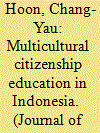

|
|
|
|
|
| Publication |
2013.
|
| Summary/Abstract |
This study investigates how multicultural citizenship education is taught in a Chinese Christian school in Jakarta, where multiculturalism is not a natural experience. Schoolyard ethnographic research was deployed to explore the reality of a 'double minority' - Chinese Christians - and how the citizenship of this marginal group is constructed and contested in national, school, and familial discourses. The article argues that it is necessary for schools to actively implement multicultural citizenship education in order to create a new generation of young adults who are empowered, tolerant, active, participatory citizens of Indonesia. As schools are a microcosm of the nation-state, successful multicultural citizenship education can have real societal implications for it has the potential to render the idealism enshrined in the national motto of 'Unity in Diversity' a lived reality.
|
|
|
|
|
|
|
|
|
|
|
|
|
|
|
|
| 6 |
ID:
185986
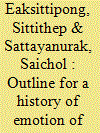

|
|
|
|
|
| Summary/Abstract |
This article attempts to cast the history of the Chinese in Thailand into a new light by framing it within the realm of emotion. Through writing the history of the Chinese from this new perspective and utilizing media such as newspapers, films, novels, etc., loaded with Chinese emotional expression towards the Thai state, society, and self as evidence reflecting emotional lives of the Chinese, we provide a preliminary outline to a history of emotions of the Chinese in Thailand. We argue that, in pursuing the assimilation of the Chinese into Thai society, the Thai state constructed an emotional regime based on the feeling of shame to govern the Chinese. The Chinese, however, found emotional refuge and liberation from the regime in transnational Chinese media and Thai-ified Sinophone literature, which played a significant role in identity politics of Chinese self-identification as neither Thai nor Chinese, but Chinese of Thailand.
|
|
|
|
|
|
|
|
|
|
|
|
|
|
|
|
| 7 |
ID:
078527
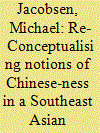

|
|
|
| 8 |
ID:
191781
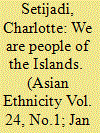

|
|
|
|
|
| Summary/Abstract |
The Riau Islands Chinese are an anomaly in the study of Chinese Indonesians. For one, while many of their ethnic Chinese counterparts in other parts of Indonesia can no longer speak Chinese due to the New Order regime’s assimilation policy, Chinese languages are alive and well in the Riau Islands. Based on ethnographic fieldwork conducted in 2017–2018, this paper seeks to understand the Riau Islands Chinese’s cultural resilience and sense of belonging as a borderland ethnic minority. I argue that long-standing inter-Island and cross-border mobilities and cultural flows with Singapore have been central to the maintenance of Riau Islands Chinese identity. Utilising translocality as a theoretical framework to understand the processes of identity formation and place-making that transcend national borders, I contend that the case study of the Riau Islands Chinese challenges the conventional state-centric modes of analyses prevalent in the study of ethnic Chinese communities in Southeast Asia.
|
|
|
|
|
|
|
|
|
|
|
|
|
|
|
|
| 9 |
ID:
103505


|
|
|
|
|
| Publication |
2011.
|
| Summary/Abstract |
The authors analyse the 2010 mayoral election in the city of Medan, North Sumatra. Medan is an ethnically and religiously diverse city and the authors treat the elections here as a case study of inter-communal dynamics in local elections in plural regions of Indonesia. The first round of the vote was contested by 10 pairs of candidates and occurred in a climate of cross-ethnic alliance building and appeals that, the authors argue, are typical of broader Indonesian patterns. The second round confronted voters with a choice between a Muslim candidate and an ethnic Chinese candidate who was also a Buddhist. There was a sudden switch in the tone and themes of the contest. A concerted campaign was launched to convince Muslim voters to support the Muslim candidate, with politicians and religious leaders alike suggesting that it was a religious obligation to do so. The campaign proved effective and the Muslim candidate, a member of the province's established political elite, won by a large margin. The article focuses on the campaign teams' strategies, analysing their electoral calculations and the techniques used to appeal to a multi-ethnic constituency. It also considers the role played in the poll by Medan's rich array of ethnic associations. The authors conclude by pointing to lessons of the Medan case for wider patterns of ethnic coalition building in Indonesia. They also describe this election as an example of the 'identity switching' that can take place when political actors choose from multiple and overlapping identity categories in changing political contexts.
|
|
|
|
|
|
|
|
|
|
|
|
|
|
|
|
|
|
|
|
|